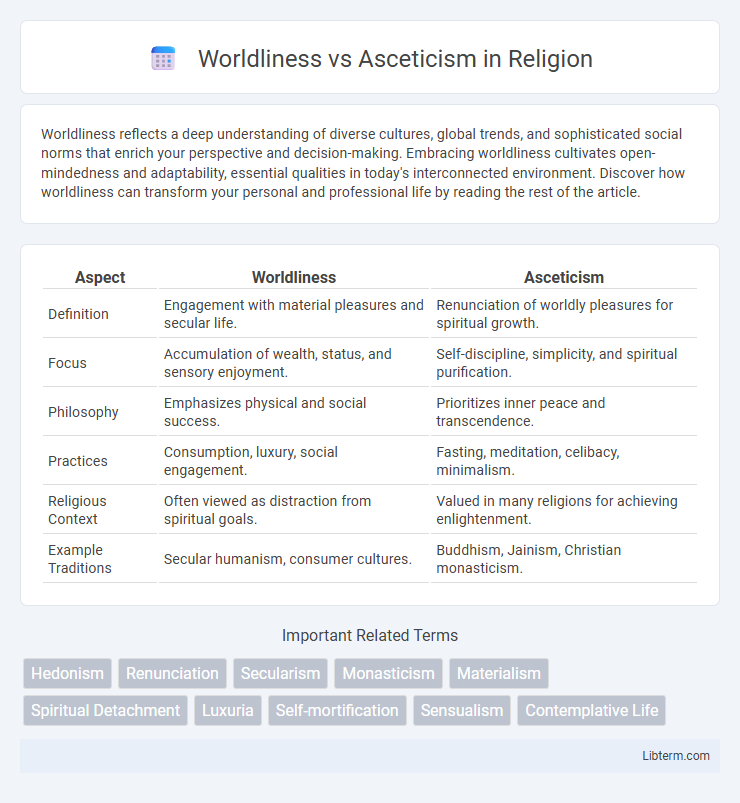Worldliness reflects a deep understanding of diverse cultures, global trends, and sophisticated social norms that enrich your perspective and decision-making. Embracing worldliness cultivates open-mindedness and adaptability, essential qualities in today's interconnected environment. Discover how worldliness can transform your personal and professional life by reading the rest of the article.
Table of Comparison
| Aspect | Worldliness | Asceticism |
|---|---|---|
| Definition | Engagement with material pleasures and secular life. | Renunciation of worldly pleasures for spiritual growth. |
| Focus | Accumulation of wealth, status, and sensory enjoyment. | Self-discipline, simplicity, and spiritual purification. |
| Philosophy | Emphasizes physical and social success. | Prioritizes inner peace and transcendence. |
| Practices | Consumption, luxury, social engagement. | Fasting, meditation, celibacy, minimalism. |
| Religious Context | Often viewed as distraction from spiritual goals. | Valued in many religions for achieving enlightenment. |
| Example Traditions | Secular humanism, consumer cultures. | Buddhism, Jainism, Christian monasticism. |
Defining Worldliness and Asceticism
Worldliness refers to a lifestyle centered on material possessions, sensory pleasures, and active engagement with societal affairs, emphasizing external achievements and comfort. Asceticism is characterized by self-discipline, renunciation of worldly pleasures, and a focus on spiritual growth through simplicity and restraint. These contrasting approaches define the balance between external indulgence and internal development in human experience.
Historical Roots of Worldliness and Asceticism
Worldliness and asceticism trace their historical roots to ancient civilizations where religious and philosophical traditions shaped divergent life approaches. Worldliness often emerged from cultural practices emphasizing material success and social status, visible in Greco-Roman societies and early mercantile economies. Asceticism originated in religious contexts such as early Christianity, Hinduism, and Buddhism, advocating self-denial and spiritual discipline as pathways to enlightenment or salvation.
Philosophical Foundations: Materialism vs Spiritualism
Worldliness emphasizes materialism, valuing tangible possessions, sensory experiences, and external achievements as markers of success and fulfillment. Asceticism, grounded in spiritualism, advocates for self-discipline and renunciation of physical pleasures to attain higher states of consciousness and inner peace. Philosophical foundations contrast the pursuit of external wealth with the cultivation of inner virtues and spiritual enlightenment.
Cultural Expressions Across Civilizations
Worldliness and asceticism manifest distinctly in cultural expressions across civilizations, shaping art, literature, and rituals. Societies embracing worldliness often emphasize material wealth, sensory pleasures, and social status in their cultural artifacts, such as elaborate architecture, vibrant festivals, and luxury goods. Conversely, ascetic cultures prioritize spiritual discipline, simplicity, and detachment from worldly possessions, reflected in minimalist art, meditative practices, and symbolic representations of renunciation.
Religious Perspectives on Worldliness and Asceticism
Religious perspectives on worldliness often emphasize the transient nature of material possessions and encourage detachment to achieve spiritual growth, as seen in Buddhism and Christianity. Asceticism is embraced as a disciplined practice involving self-denial and renunciation of worldly pleasures to attain higher spiritual states, exemplified by Hindu sannyasis and Jain mendicants. Diverse traditions interpret worldliness and asceticism differently, but many promote ascetic practices as a path to overcoming ego, attachment, and suffering.
Psychological Impacts: Pleasure and Discipline
Worldliness often enhances psychological well-being through the pursuit of pleasure, stimulating dopamine pathways and fostering social connections that boost happiness and satisfaction. In contrast, asceticism cultivates discipline by promoting self-control, reducing impulsivity, and increasing resilience to stress, which can lead to long-term emotional stability and a stronger sense of purpose. Both approaches impact mental health differently: worldliness offers immediate gratification and social engagement, while asceticism supports sustained psychological endurance and inner peace.
Modern Manifestations of Both Lifestyles
Modern manifestations of worldliness emphasize consumerism, digital connectivity, and the pursuit of material success, reflecting a global culture driven by instant gratification and social status. In contrast, contemporary asceticism often appears through minimalist living, mindfulness practices, and sustainable lifestyles that prioritize spiritual well-being over possessions. Both lifestyles intersect in urban environments where individuals navigate identity and purpose amidst technological advancements and cultural pluralism.
Benefits and Drawbacks of Embracing Either Path
Embracing worldliness fosters social connections, material comfort, and experiential growth but risks distraction, attachment, and spiritual neglect. Asceticism cultivates discipline, inner peace, and detachment from material desires while potentially leading to social isolation, physical deprivation, and reduced engagement with worldly opportunities. Balancing these paths requires evaluating personal values and life goals to optimize well-being and purpose.
Striking a Balance: Integrating Worldliness and Ascetic Practices
Striking a balance between worldliness and asceticism involves integrating mindful detachment with active engagement in daily life, allowing individuals to enjoy material experiences without becoming enslaved to them. This harmonious blend promotes inner peace and spiritual growth by fostering disciplined self-control alongside appreciating worldly pleasures. Cultivating such equilibrium requires consistent reflection, prioritizing purposeful living while maintaining simplicity and moderate desires.
The Future Relevance of Worldliness and Asceticism
The future relevance of worldliness and asceticism lies in their opposing approaches to materialism and spiritual growth amid rapid technological advancements and global cultural shifts. Worldliness emphasizes engagement with worldly pleasures, innovation, and economic progress, while asceticism advocates for simplicity, self-discipline, and detachment from material excess to foster mental clarity and ethical living. Balancing these principles can shape future societal values, influencing well-being, environmental sustainability, and the ethical use of emerging technologies.
Worldliness Infographic

 libterm.com
libterm.com